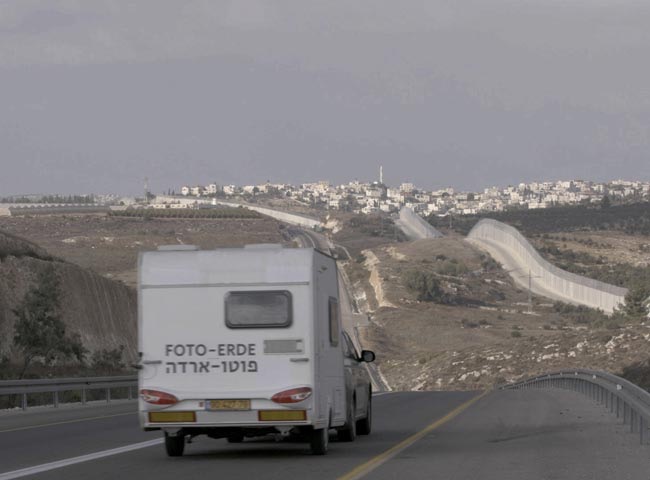Pour nos yeux
-
Réalisé par Tamara Erde • Écrit par Tamara Erde
-
Allemagne • 2018 • 95 minutes • Video Full HD • Couleur
- Réalisation :
Tamara Erde - Écriture :
Tamara Erde - Image :
Tulik Galon, Gaétane Rousseau - Son :
Ronen Geva, Cédric Lionnet - Montage :
Samuel Laius - Musique originale :
Siegfried Canto
- Production (structure) :
Katuh Studio - Coproduction :
13 Prods - Participation :
Angoa-Agicoa, Région Provence-Alpes-Côte d'Azur, CNC. COSIP, Procirep - Ayant droit :
Katuh Studio
- N° ISAN :
ISAN 0000-0004-9331-0000-7-0000-0000-G
Résumé
La réalisatrice traverse Israël et déplie l'album des photographies prises par son grand-père Ephraïm Erde, photographe officiel du mouvement sioniste dans les années 1930. Ce road-movie alterne les paysages réels d'aujourd'hui et les photos à la gloire des "pionniers". Parfois, Tamara Erde les projette dans un espace public et recueille ou pas des réactions. Ce n'est pas un éloge classique du passé, mais une interrogation vive. En effet, le grand-oncle, frère du grand-père, était lui aussi photographe mais opposant au sionisme. Les tensions familiales sont encore là. Une partie de la famille est laïque. "Qu'est-ce qui a remplacé la religion dans notre famille ?" demande la réalisatrice à sa grande-tante. Réponse : "L'idéologie".
Le parcours de Tamara Erde l'amène de Kibboutz en Kibboutz. Ces villages collectivistes ont été importés par les juifs russes socialistes au début du XXe siècle. Une utopie folle. Un modèle voulu "égalitaire", sans propriété, à l'éducation collectivisée. Comment regarder ce modèle aujourd'hui ? Plus du tout révolutionnaire ? Un film qui réussit ces deux chemins : le subjectif et l'objectif.
Looking for Zion is a journey I embark on following the photographs of my grandfather, Ephraim Erde, a famous Zionist photographer from the 1930s.
This journey reveals to me new ideas about his choices and image-making, which are leading me to question and critically examine the history of the Israeli society and the Zionist dream in the past and in the present, as they are reflected from the confrontation of the visuals of my grandfather and through my lens today.
In 1933, Ephraim emigrated from Poland to Israel (then Palestine, under the British mandate) and began to restlessly document the realization of the Zionist dream, becoming the official photographer of the governing socialist party, the Kiboutzs and the workers movement. I, his granddaughter, was born in the country which its establishment he has documented.
In this film I decide to follow my grandfather’s vision through his photographs, and to examine the imagery of Israel through both our eyes: his and mine. By doing so I hope to better understand the evolution of his dream, its turning points and mistakes and to be able to imagine a different possible future today.
The stories that come up from the photographs are interlacing the family, intimate side and the national, collective aspect, which remains in the centre, yet receives new lights and clues from the revelations and understandings I collect about my family and my grandfather’s life course and choices. The huge gap between those two visual worlds, of past and present, of his and mine, are raising many questions about the evolution of Israel and the critical turning points in its history. This gap between our two visual worlds brings us to interrogate the act of photography itself as well: what is included and what is left out of the frame? In what way do ideology and political vision change and shape the photographer’s work? And what role does image-making play in the creation of a nation?
In that gap between his images and mine, between what I learn about his life story and ideas and the images he had left behind, I wish to examine the story of my homeland from a new perspective: that of the image and the ability of the image to shape and transform the reality it reflects.
Comment avoir accès au film ?
-
Édition DVD
- Il n'existe pas d'édition DVD à notre connaissance
-
Accès VOD
- Il n'existe pas d'accès en VOD à notre connaissance
- Distribution
- Aide sur les moyens d'accéder à un film
